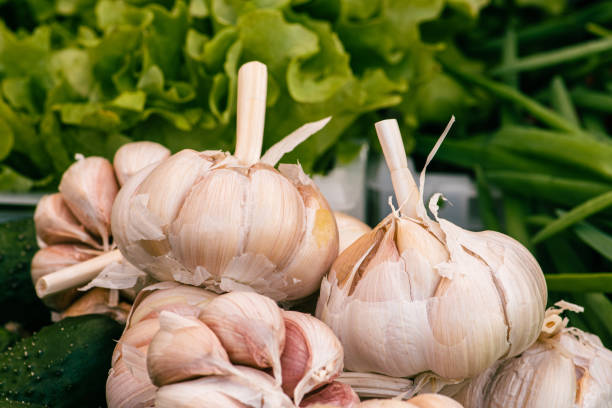The Health Benefits of Garlic
Garlic is one of the best natural anti-infectives available. Studies show that it kills a variety of microorganisms responsible for both common and rare infections, and improves immunity.
It also regulates blood sugar and cholesterol, inhibits the clotting of platelets and has anti-inflammatory properties. Adding garlic to your diet can help protect against heart disease and cancer.
1. Lowers Cholesterol
A clove of raw garlic is actually a segment of the Allium sativum plant, and each one is packed with health-promoting nutrients like vitamins C and B6, oligosaccharides, amino acids and allicin. Allicin is the component of garlic that gives it its characteristic smell and health benefits. In fact, research shows that when consumed regularly, garlic can lower cholesterol and blood pressure levels.
It’s also a natural method of guarding against atherosclerosis, or hardening of the arteries, which can lead to a heart attack or stroke. Garlic’s antioxidant properties decrease the “stickiness” of platelets, and it contains anticlotting compounds that help prevent clot formation.
In a study published in the scientific journal Maturitas, researchers found that consuming aged garlic extract lowered both systolic and diastolic blood pressure in people with metabolic syndrome, a group of conditions that increases your risk for heart disease, diabetes and high cholesterol. However, it’s important to talk with your doctor before consuming any dietary supplements, including aged garlic extract.
2. Lowers Blood Pressure
Garlic’s antioxidants may help lower blood pressure. It is believed that the organosulfur compounds in garlic reduce oxidative stress and protect against high blood pressure, per a 2019 study published in the journal “Metabolism and Clinical Nutrition.”
Eating garlic may also help guard against atherosclerosis, which can lead to hardening and narrowing of the arteries, increasing your risk for heart attack and stroke. Per the National Heart, Lung and Blood Institute (NHLBI), compounds in garlic and onions decrease the’stickiness’ of our platelets, which helps to prevent blood clots from forming in the arteries.
People who eat more than two servings of fresh, cooked or minced garlic daily can benefit from its lowering effects on high blood pressure. However, if you have gastrointestinal illnesses like irritable bowel syndrome or gastroesophageal reflux disease, eating garlic may increase gas and bloating, so talk to your doctor before adding it to your diet.
3. Promotes Brain Health
Garlic has been used as both a food flavoring and medicine for thousands of years. It contains a variety of minerals, vitamins and nutrients including vitamin C, folate, potassium, calcium, phosphorus and zinc. It also has antioxidant properties thanks to its allicin.
Allicin prevents the oxidation of LDL cholesterol in the bloodstream, thereby protecting against clotting and lowering blood pressure. This makes garlic beneficial for those with high blood pressure.
Other studies have shown that consuming garlic can protect against Alzheimer’s disease and other forms of dementia. Researchers think this may be due to the antioxidant and anti-inflammatory properties of allicin that reduce oxidative stress and inflammation in the brain.
The organo-sulfur compounds in garlic (diallyl thiosulfonate, diallyl disulfide, diallyl trisulfide, E/Z-ajoene and S-allylcysteine) have been found to effectively destroy glioblastoma cells, which are the most deadly form of brain cancer. In addition, aged garlic extract has been shown to inhibit cellular growth in cancer cells and promote apoptosis.
4. Boosts Immune System
A compound in garlic called allicin provides antibacterial, antifungal and antiviral properties. Allicin also helps boost the immune system, and can even help your body break down toxins and lower inflammation levels.
Studies suggest that consuming two to three cloves daily can support your immune system. However, be aware that if you cook the garlic, the alliinase enzyme that converts allicin to the beneficial form of allicin may be deactivated. So, to get the most out of the immune-boosting benefits of this culinary mainstay, you should eat raw garlic or take a garlic supplement that contains allicin.
Garlic has been used since ancient times to alleviate weariness and boost laborers’ working hours and endurance, and it was even fed to Greek Olympic athletes. Modern research has shown that the consumption of fresh, pressed or cooked garlic and its extracts can improve health by lowering cancer risk, cardiovascular pathologies, metabolic disorders, blood pressure and cholesterol as well as improving skin, hair and bone health.



